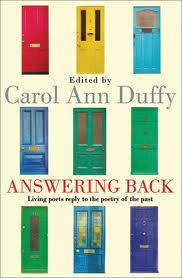Our book group choice for October 2009 is Answering Back by Carol Ann Duffy. Carol Ann Duffy has asked some of the brightest writers in the poetry world to select a poem that is meaningful – or has meant something – to them, and write a response to it.
Answering Back is a collection of 50 poems by contemporary poets who respond to poems from the past. Edited by Carol Ann Duffy, the anthology features works by both established and emerging poets, including Paul Muldoon, Vickie Feaver, U. A. Fanthorpe, and Duffy herself.
The poems in Answering Back are arranged chronologically, beginning with the 17th century and ending with the 21st century. Each poet was asked to choose a poem that was meaningful to them and to write a new poem in response to it. The result is a collection of poems that speak to one another across the centuries, exploring themes of identity, gender, sexuality, and the nature of poetry itself.
One of the most striking things about Answering Back is the way in which the poets engage with the poems they are responding to. Some poems are direct responses, while others are more oblique. Some poems challenge or subvert the original poem, while others offer a more sympathetic reading. But all of the poems in Answering Back are marked by a deep engagement with the work of the past.
One of the most interesting poems in the collection is “Originally” by Carol Ann Duffy. In this poem, Duffy reflects on her own sense of Scottish identity, which was shaped by her childhood in Scotland and her later move to England. The poem also explores the ways in which our sense of identity is shaped by our experiences and memories.
Another striking poem in the collection is “Text” by Vickie Feaver. In this poem, Feaver reflects on the way in which technology has changed the way we communicate with each other. The poem is both a celebration and a critique of the digital age, and it raises questions about the nature of intimacy and connection in the 21st century.
Answering Back is a fascinating and thought-provoking collection of poems. It is a book that will appeal to both lovers of poetry and those who are new to the form. The anthology is a testament to the power of poetry to connect us with the past and to help us understand ourselves and the world around us.
In addition to the poems themselves, Answering Back also includes an introduction by Carol Ann Duffy, as well as a series of essays by the poets who contributed to the anthology. These essays provide insights into the poets’ creative process and their thinking about the poems they chose to respond to.
Discussion Questions
- How does Duffy use language to challenge traditional gender roles?
- What are the different ways that Duffy explores the themes of identity and selfhood in her poems?
- How does Duffy use her poems to address issues of social inequality and injustice?
- What are the different ways that Duffy uses humor in her poems?
- How does Duffy’s use of form and structure contribute to the meaning of her poems?
- What are the different ways that Duffy uses imagery and symbolism in her poems?
- How does Duffy’s use of voice and persona contribute to the meaning of her poems?
- What are the different ways that Duffy’s poems engage with the past?
- How do Duffy’s poems reflect the cultural and historical context in which they were written?
- What are the different ways that Duffy’s poems challenge or subvert the expectations of the reader?
- How do Duffy’s poems relate to other works of literature, both past and present?
- How do Duffy’s poems reflect her own personal experiences?
- What are the different ways that Duffy’s poems can be interpreted?
- What are the implications of Duffy’s poems for our understanding of the world?
- How do Duffy’s poems challenge or change the way we think about ourselves and the world around us?

